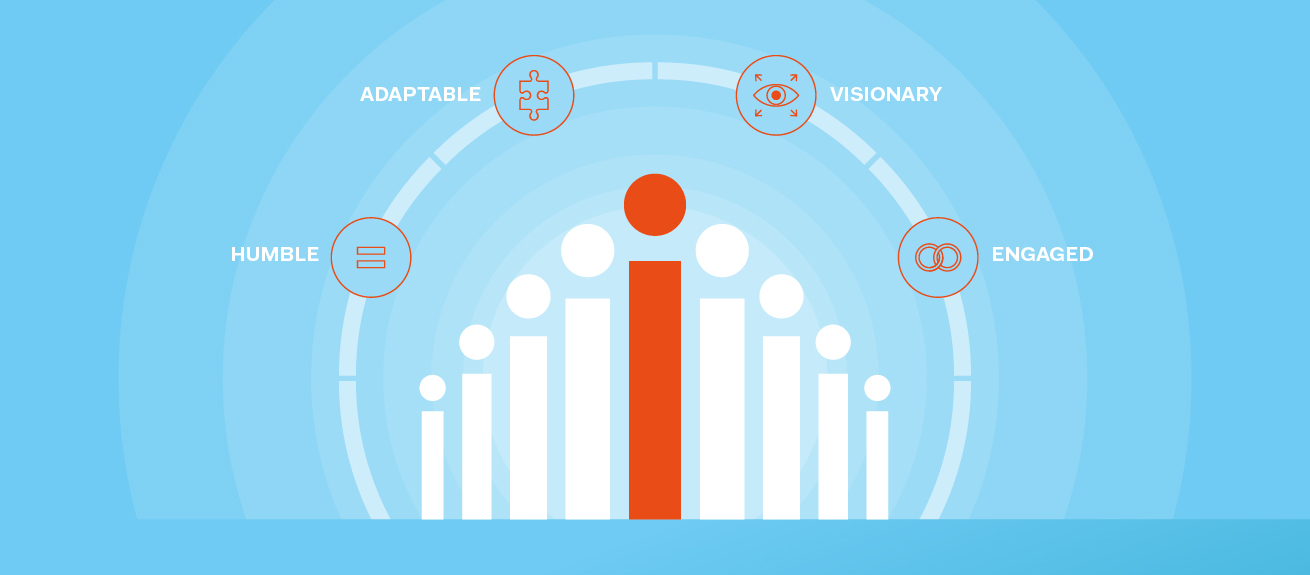
The Global Center for Digital Business Transformation, an initiative of IMD business school and Cisco, and HR consultancy metaBeratung, have identified four competencies and three behaviours that business leaders need in order to excel in the era of digital disruption. A new report, Redefining Leadership for a Digital Age, presents findings from a global survey of more than 1,000 executives across 20 different sectors.
In turbulent times, leaders are caught in a technology-change vortex that is drawing in whole industries and creating disruption on an unprecedented scale. An eye-watering 92% of leaders said they are feeling the effects of digital disruption, with one-third rating the impact of digital disruption on their companies as “very significant.”
Despite the quickening pace of digital innovation, less than 15% of leaders said that they were “very prepared” to meet the demands of a digitally-disrupted business environment. The majority of participants (almost 80%) indicated that they were “starting preparations” or were “fairly prepared” to tackle digital disruption.
The research further reveals:
• Less than 20% of respondents indicated that digital technologies such as analytics, mobile and social media are fully integrated into their organisations
• 30% of respondents either rarely or only occasionally use digital tools and technologies
In light of the clear understanding of the importance of digitisation, the report outlines the following “HAVE” competencies as the most important success criteria for leaders facing a landscape characterized by digital disruption:
• Humble — In an age of rapid change, knowing what you don’t know can be as valuable in a business context as knowing what you do. Digital leaders need a measure of humility, and a willingness to seek diverse inputs both from within and outside their organisations
• Adaptable — In a complex and changing environment, an ability to adapt is critical. The global reach of digital technologies has opened up new frontiers for organizations, shrinking once insurmountable continental divides and erasing traditional boundaries between territories. Dealing with the cultural and business impacts of this requires adaptability.
• Visionary — In times of profound disruption, clear-eyed and rational direction finding is needed. Having a clear vision, even in the absence of detailed plans, is a core competency for digital leaders.
• Engaged — Painting visions for the future, successfully communicating these visions and being adaptable enough to change them, requires constant engagement with stakeholders. This broad-based desire to explore, discover, learn and discuss with others is as much a mind-set, as it is a definable set of business-focused activities or behaviours
These digitally-engaged executives are called “Agile Leaders” — those who have adapted and evolved their practise for an environment continuously disrupted by digital technologies and business models.
Nearly half (42%) of those identified as Agile Leaders said that they were making more informed business decisions as the result of well-directed data gathering, effective analysis, and good judgment.
The report identified the following additional practices that Agile Leaders adopt in a digitally-disrupted business environment:
• 26% of Agile Leaders use digital tools and technologies frequently, compared with just 7% of non-Agile Leaders
• 32% of Agile Leaders seek disruptive approaches to deal with challenges (1% non-Agile Leaders)
• 28% of Agile Leaders use virtual networks and forums (1% non-Agile Leaders)
• 76% of Agile Leaders encourage their team to challenge their observations and opinions (19.4% non-Agile Leaders)
• 27% of Agile Leaders make use of business simulations or scenarios to support decisions (1% non-Agile Leaders)
• 26% of Agile Leaders take risks to speed up execution (4% non-Agile Leaders)
The findings build upon previous research by the Global Center for Digital Business Transformation, which has demonstrated the importance of Digital Business Agility — a set of meta-capabilities that describe an organisation’s readiness to sail in the choppy waters of rapid technology and business model change.
The survey was supported by in-depth interviews with leaders from both incumbent organisations and disruptive start-ups. Read the full report here.
Carlos Torres Vila, CEO, BBVA, said: “We are taking decisive steps in the Group’s transformation in order to create the best possible experience for current and future customers. The goal is for BBVA to be the best bank of the digital age.”
Jeff Immelt, CEO, General Electric, said: “What we’ve tried to do is narrow our focus as a company, to be only those things that have significant core competency. So, that’s led us into being a global infrastructure leader… We’re playing to the company’s strengths, and, at the same time, we’re playing to those things that the world needs… That’s led us to be more global. It’s led us to be more technical. It’s led us to exit media, shrink financial services, and be in those things that we think are core to the company.”
A joint initiative of IMD and Cisco, the Global Center for Digital Business Transformation (DBT Center), is a global hub for leading research and analysis on digital disruption.
metaBeratung is a leading Management and HR-Consultancy with offices in Germany, Austria and Switzerland.


